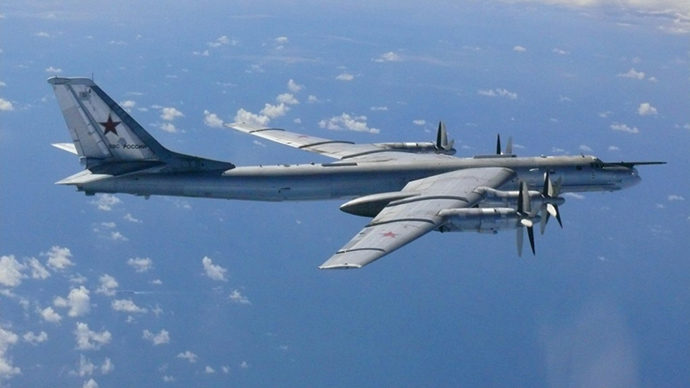The past week has seen what observers are calling an “unusual
level of air activity” over European airspace. On October 28th,
NATO detected and tracked seven Russian combat aircraft over the Baltic Sea.
The 29th saw the Royal Norwegian Air Force scrambled to intercept
eight Russian aircraft, six of which turned back towards Russia, while the
remaining two flew on to Portugal before returning home. On Friday the British
RAF scrambled typhoons to respond to a Russian Tupolev Tu-95 bomber (Bear
bomber) as it approached UK airspace. Overall, NATO has scrambled to intercept
Russian jets more than 100 times so far this year, a
threefold increase over the 2013 total. This flurry of activity, many
argue, is indicative of Russian military (and political) resurgence and
adventurism – it is testing NATO’s defenses and gauging reaction times (and
resolve), contemplating its next move as the West tries to respond to the
annexation of Crimea and support for Ukrainian rebels.
Of particular concern is the fact that the Bear bombers are
a launch
platform for the Raduga Kh-55 nuclear-tipped cruise missile (with a 1,600
nautical mile range), which has led commentators to speculate that Russia is
rehearsing nuclear strikes (not a totally foreign concept – consider the 2009
Zapad exercises ending with a nuclear attack on Warsaw). The Russians also
failed on at least some of these excursions to adhere to international air
traffic norms – the Daily
Beast reports that the Russians did not file a flight plan and did not
activate transponders. Such actions prevent civilian air traffic controllers
from seeing the Russian bombers – especially problematic in the busy airspace
over the Atlantic – and thus increase the chances of a collision with a
civilian airliner.
Furthermore, it is important to note that Russia has
actually tested all three legs of its nuclear triad over the past few days. On
Wednesday, the Yury Dolgoruky – a
Borey-class submarine – launched
a Bulava missile from its submerged position in the Barents Sea. This was
its first operational test launch as part of combat training. And on Saturday
the Russian Defense Ministry announced the successful test of a Topol-M
intercontinental ballistic missile, claiming that it demonstrated overall good
performance and hit its designated target.
At the same time, states do not act in a vacuum. The U.S.
Strategic Command’s Exercise
Global Thunder 15 – STRATCOM’s largest annual exercise – ended on October
29th. This exercise includes a specific focus on nuclear readiness
and includes flying B-52s and B-2s (both long-range multi-role bombers capable
of delivering nuclear munitions) up to the Arctic and back, more or less
simulating a one-day nuclear war. According to some observers, it is frequently
followed by Russian long-range bomber exercises, which would suggest that
recently observed activity is not as far outside the norm as some suggest.
Arguably, Russia is simply responding to an American demonstration of military
and nuclear might with one of its own, in keeping with normal patterns.
One also needs to seriously consider the intent behind the
recent activity – conducting military exercises, test launches, and so forth
are actions that should communicate a specific message of some kind. A key (and
potentially dangerous) challenge in such messaging, however, is to understand
the content and to correctly identify the intended recipient(s). For example,
is Russia using its Bear bombers to warn
Finland and Sweden away from NATO? To remind Europe in its entirety that
Russia is a great and nuclear power willing to use force? To demonstrate to the
U.S. that it is willing to go further in a game of chicken, ignoring international
norms in conducting its exercises? These are all definite possibilities, but we
cannot ignore the idea that the intended audience is the Russian population or
security services. The Russian economy is struggling under the weight of
international sanctions
and (probably more importantly) the sustained
low price of oil. President Vladimir Putin may be relying on sentiments of
nationalism, inflamed by challenging a West bent on keeping Russia weak and
subservient, to sustain legitimacy and power in the face worsening conditions.
That is certainly one explanation for the presence of a television crew
aboard the Yury Dolgoruky when it
launched a missile on Wednesday: there is nothing quite like bringing the
nation along with you to the successful launch of the very weapon that has for
so long symbolized Russian power to stir national pride.
For the time being, while NATO may get a better measure of
Russian capabilities thanks to their increased activity, Putin’s precise intent
will likely remain unknown. This is not to suggest that the West should not
respond, however. Increasing NATO’s presence in its East, scrambling to respond
to Russian bomber flights, and similar actions are perfectly acceptable and
perhaps even necessary replies to Russia’s activism. It Is important for the
West to attempt to decipher, understand, and respond to Russia’s actions (and
messages), but it is equally important to consistently send explicit messages
of our own. The execution of Global Thunder last month is an excellent example
of such messaging. While some argue that conducting nuclear exercises at a time
when tensions are so high threatens to aggravate the
situation, for the U.S. to cancel the exercise would have inevitably
communicated the idea that the U.S. (and NATO by proxy) were backing down in
the face of Russian aggression and power. This in and of itself has the
potential to further incentivize Russian adventurism in its neighborhood. At
the very least, it would weaken an important disincentive. Moving forward, the
Atlantic Alliance should focus on decoding Russian messages and undertaking
activities that explicitly communicate both its commitment to upholding its
obligations and its willingness to resist and counter Russian aggression in all
areas (preferably without inducing unintentional escalations).


1 comment:
Invictus Security Services is the best security company providing the well trained Professional Security Guard for Personal Security
Post a Comment